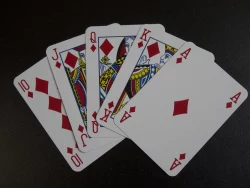
Poker is one of the most popular games played worldwide. When learning to play poker, finding the best online casino to practice your skills is essential to improving your skills.
In this guide, you’ll learn how to play poker from a beginner’s perspective and understand a total betting round.
What are the Basic Rules of Poker?
Poker has many different card games, each with its unique set of rules. Texas Hold ’em stands as the world’s most popular poker game.
Other games played at the largest poker rooms include Omaha and Five Card Draw. Although all of the different poker variants play with unique rules, the fundamentals of betting, bluffing, standard terms, and poker hand rankings apply to nearly all game varieties.
This guide will outline the basic rules for three prominent poker variants: Texas Hold ’em, Five Card Draw, and Omaha.
Rules of Texas Hold’em

Texas Hold’em aims to make the best five-card hand using two-hole cards and five community cards. The first round begins with each player getting two hole cards, which are dealt face down and seen only by the player holding them until the end of the hand.
When each player receives their two-hole cards, the pre-flop betting round begins. Sequentially, the dealer puts the first three of five community cards on the table. Those three cards are face up and known as the flop.
After the flop hits the board, another betting round commences. The flop betting round precedes another community card hitting the panel, known as the turn.
The turn-betting round precedes the dealer putting a fifth card on the board (River). The dealing of the river begins the final round of betting, after which all remaining players show their hole cards. The player with the best five-card hand, using any combination of hole cards and community cards, wins.
Rules of Five-Card Draw Poker

A game of Five Card Draw starts with each player dealt five hole cards, all of which are face down and seen only by the player holding them.
After the deal, a betting round commences. Following that betting round, all players can discard as many cards as they wish, with the dealer replacing those discards with new cards.
When all players have discarded and drawn their selected number of cards, a final round of betting takes place. All remaining players (players who haven’t folded at some point in the hand) then showdown their cards, and the best five-card hand is the winning hand.
Rules of Omaha Poker

Omaha Poker plays similarly to Texas Hold ’em but with a few fundamental differences. Each player in a game of Omaha deals four-hole cards instead of two.
In Omaha, players must use precisely two hole cards in combination with three community cards to make the best hand. Like Texas Hold ’em, the dealer puts five community cards across three betting rounds: the flop, turn, and river. The best hand wins.
There are other variations of which you should be aware. A few different poker variants include Crazy Pineapple and Seven Card Stud.
Most Important Poker Terms
- Chips – represent money at the table. In a cash game, the different chip colors are equivalent to varying dollar amounts and redeemable for real money.
- Banker – The banker is responsible for exchanges of cash and chips for all players.
- Betting Limits – Betting limits denote the maximum allowed bets and raises in games using a limited betting structure.
- Table Stakes – Table stakes indicate the amount of the big blinds or the betting limits in a given poker game.
How To Get Good At Poker
A player who puts time into poker study will always have an edge against another player who doesn’t put work into the game. A solid poker strategy base begins with fundamental knowledge of standard terms, poker hand rankings, betting rules, and bankroll management.
This guide can help you understand the rules of poker. Feel free to dive into in-depth poker strategy books that delve into game theory.
